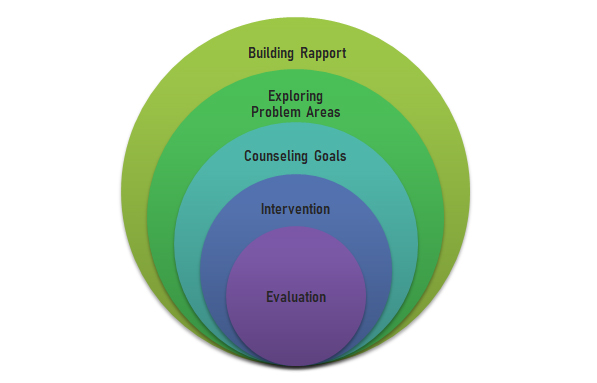Psychological Vs. School Counseling: Stages And Their Differences
 The concept ofcounseling has existed for a long time. The urge to understand human behavior is significant in society. Though there are various fields of psychology, understanding ourselves, enhancing our potential, and helpingothers with their problems under appropriate conditions has always been a crucial part of formal guidance practice.
The concept ofcounseling has existed for a long time. The urge to understand human behavior is significant in society. Though there are various fields of psychology, understanding ourselves, enhancing our potential, and helpingothers with their problems under appropriate conditions has always been a crucial part of formal guidance practice.
Counseling is an act of helping a person to navigate through difficulties that include psychological and emotional distress. A confidential process that takes place between the client and the counselor.
Counseling is NOT –
■ Giving advice – telling the client what and what not to do!
■ Looking at the issues of the client from your perspective – it is rather putting yourself in the client's shoe
■ Getting emotionally attached with the client or his/her situation – this affects the counseling process
Now let's elaborate on the essential steps of "Counseling Round Process" that takes place in the formal psychological counseling sessions –

Steps Involved in One on one Counseling
Step 1 – Building Rapport
At the primary stage, the counselor builds the foundational relationship with the client. This is the most crucial stage that leads the later part of the counseling process to have a successful intervention. It helps the client to establish trust in the counselor, in turn the counselor gets to know his/her client. The rapport between the counselor and the client sets the tone for rest of the therapeutic stages. The counselor must be open, welcoming, and empathetic towards the client.
Step 2 – Exploring the Problem Area
Once the rapport has been established, the counselor can slowly start to explore the problem areas. The base question is why the client is seeking counseling? The counselor begins to understand client’s situation, find out the core reason behind the distress and discover how the triggers look like. The counselor's job at this stage is to gather as must as information related to the issues.
Step 3 – Setting Counseling Goal
Counseling goal setting involves commitments to take action for problem resolution. Both the counselor and client forms collective decision regarding implementing certain actions that are going to help in his/her personal growth. By the time counselor reaches this stage, it is a possibility that the client has begun to understand and integrate the problem areas with counselor guidance.
Step 4 – Intervention
Counseling intervention reflects the style of a counselor – which approach will be adapted. There are various viewpoints as to what good counseling looks like. The strategies and techniques that are chosen by the counselor can be influenced by the belief of the counselor; it also depends on the client’s background and personality. Whether the counselor is actively involved in the intervention or acts as a guiding force to help the client achieve full potential, intervention is more of a collaborative approach.
Step 5 – Progress Evaluation
In the final stage of counseling, irrespective of what the outcome is, the counselor must dive in to assess the progress of his/her client. Though it is a motto of the counselor to achieve successful termination, oftentimes, client's position may speak otherwise. During such situations, the counselor needs to evaluate client’sprogress, measure the tools and techniques on the ground of affectivity, and explore options for better resolution. And if the interventions reflect total affectivity, client can be released with utmost sensitivity. In this scenario, the counselor can empower the client towards autonomy.
Holding a trusting space for the client is primary in all forms of counseling.The major role of a psychological counselor is to reduce the confusion within the mind of the client. Enable them to make decisions in their life and lead their life positively.
So, How Different is School Counseling!
Broadly, counseling psychology deals with vocational and academic issues. Schools or other educational institutions too, often require counselors. Those professionals work towards helping students improve their behavior, interpersonal and social skills. They also help to maintain order in the school and facilitatestudents’ achievement.
One prominent difference is – Counselor who works in an educational setting, may or may not be a trained psychological counselor and are often known as the guidance counselor. Most importantly, school counselors function as a consultant to teachers and administrators rather being a one-on-one clinician.
The need for teachers training in the areas of psychological understanding is an integral part of education. School counselor’s role is to create a healthy learning environment, a place where students and teachers are in harmony to seed education in practical ways. Effective counseling in educational institutes is becoming more and more important these days. It is paramount to promote holistic well-being of students. Help students feel empowered, and facilitate growth in their lives also helps us achieve collective growth in modern society.
A counselor’s job encompasses –
■ Addressing the prevailing psychological and social matters such as bullying, sex education, violence, and other behavioral issues
■ Help students with their choice of career
■ Helps student with conflict resolution and interpersonal issues with peers
■ Counselor (given their expertise) also helps special needs students
■ Educates teacher, and parents about the mental health concerns
Rounding up to what we have discussed so far, both psychological counselor and school counselor plays a vital role in present days with the help from counseling for students in schools. In many ways, their works are similar to how they contribute. The variation lies in the technical competencies and nature of work. Educational psychology offers students with mild adjustment problems, whereas, psychologist serves their expertise in a deeper level.